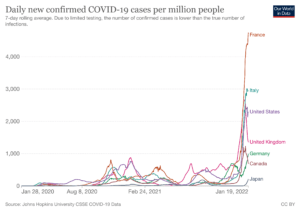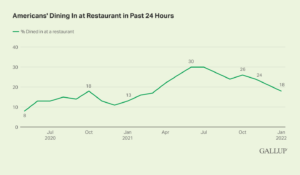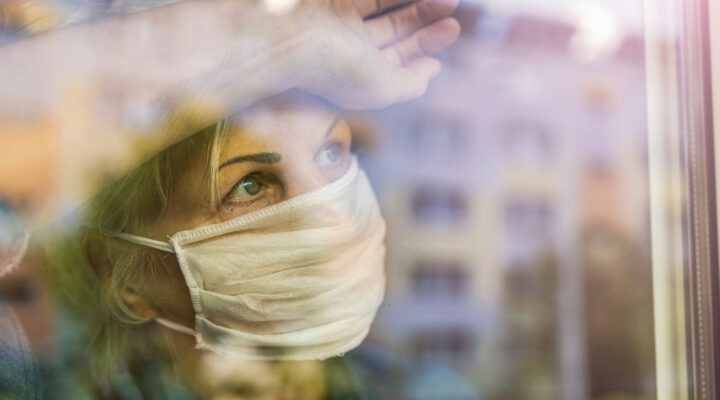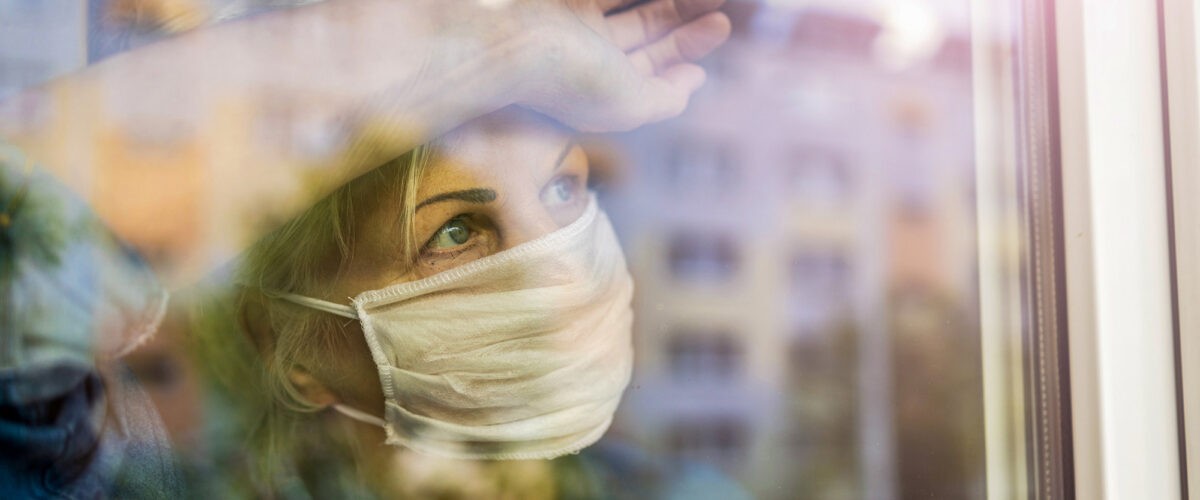If in-person attendance at your church has declined in recent weeks, it’s probably a sign of Americans’ increasing concern about getting COVID-19.
Gallup reports that its survey of American adults from Jan. 3 to Jan. 14 found increasing concern about the Omicron variant, decreasing optimism about the trajectory of the pandemic, and decreasing willingness to go anywhere in a large crowd.
“As was the case last July, when Delta infections began to surge, Americans’ worry about contracting the virus is now on the rise,” the research firm reported. “Worry has jumped 12 points to 50% since the previous reading in late November/early December and is now the highest it has been since last winter, before COVID-19 vaccines were readily available to the general public.”
 Worry about the virus has increased by double digits among all age groups, Gallup noted, with the greatest jump among older Americans. Worry among Democrats, independents and those who are vaccinated against the disease also has risen by double digits.
Worry about the virus has increased by double digits among all age groups, Gallup noted, with the greatest jump among older Americans. Worry among Democrats, independents and those who are vaccinated against the disease also has risen by double digits.
Then this: “Throughout the pandemic, increased worry about contracting COVID-19 has resulted in an uptick in Americans’ social distancing behaviors. With the recent sharp rise in U.S. COVID-19 cases, more Americans now report avoiding situations that might expose them to the virus.
Among the representative sample of adults surveyed, 56% said they avoided large crowds in the previous week because of their concern about coronavirus. Likewise, 41% said they are staying away from public places such as stores and restaurants. Fewer, 34%, say they have avoided small gatherings — but the percentage of Americans avoiding small gatherings has jumped 13 points since late November.
 The number of confirmed COVID infections in the United States currently is by far the largest of the entire pandemic timespan, having quintupled since Christmas Day.
The number of confirmed COVID infections in the United States currently is by far the largest of the entire pandemic timespan, having quintupled since Christmas Day.
Gallup’s charts and graphs illustrate the ups and downs of Americans’ attitudes and worry about COVID-19, with peaks corresponding to the rise of the Delta variant and now the Omicron variant.
American hopefulness about the pandemic “is now being crushed by Omicron,” the firm reported — even though many more people are vaccinated.
In May and June 2021, with the rollout of readily available vaccines, more than four in five adults believed the coronavirus situation was getting better. Then, as the Delta variant began to spread in July, that figure plummeted to 15%. By October, with infections from the Delta variant slowing, 51% of adults once again thought the situation was improving. But as news of Omicron’s emergence began to circulate in November, the percentage saying the situation was improving fell 20 percentage points. Now, optimism is down an additional 11 points.
Today, only 20% of U.S. adults believe the pandemic is improving, while 22% think it is staying the same and 58% believe it is worsening.
I ndoor dining at restaurants is one indicator of American attitudes. Although in certain communities, restaurants appear to be full once again, nationwide since May 2020, no more than 30% of U.S. adults have reported dining inside a restaurant in the previous 24 hours, according to Gallup. That number is now down to 18%.
ndoor dining at restaurants is one indicator of American attitudes. Although in certain communities, restaurants appear to be full once again, nationwide since May 2020, no more than 30% of U.S. adults have reported dining inside a restaurant in the previous 24 hours, according to Gallup. That number is now down to 18%.
Another comparison for churches is Americans’ attendance at movie theaters.
In early January, Gallup reported that over the previous 12 months, Americans watched an average 1.4 movies in a movie theater — down from 4.8 movies on average between 2001 and 2007. More importantly, Gallup found that in 2021, 61% of Americans did not visit a movie theater at all, the highest number in Gallup’s tracking history.
“Attendance appears to remain depressed even with movie theaters now open and vaccinations available to most Americans, suggesting continuing public concern about catching COVID-19 in indoor establishments like theaters,” Gallup reported.
Meanwhile, the use of face masks in public remains unchanged. “Since August, roughly seven in 10 U.S. adults, including 72% in the new survey, say they have worn face masks when out in public in the past seven days,” Gallup reported. “Since mid-April 2020, no fewer than six in 10 Americans have done so, including more than nine in 10 in the summer of 2020, when many businesses were requiring face coverings.”
The use of face masks remains one of the most politically charged divisions among Americans today.
“Views of the pandemic remain sharply politically polarized, and the steady share of about one-fifth of the adult population that is not vaccinated against COVID-19 is largely eschewing masks and social distancing measures,” Gallup said. “Meanwhile, public health officials continue to promote the use of masks and the benefits of vaccines as the way to end the pandemic.”
Related articles:
Most comprehensive study yet of COVID’s impact on churches finds uneven results
What if they don’t all come back to church? | Opinion by Jason Koon
Largest-ever U.S. congregational survey confirms what church consultants have been telling you


